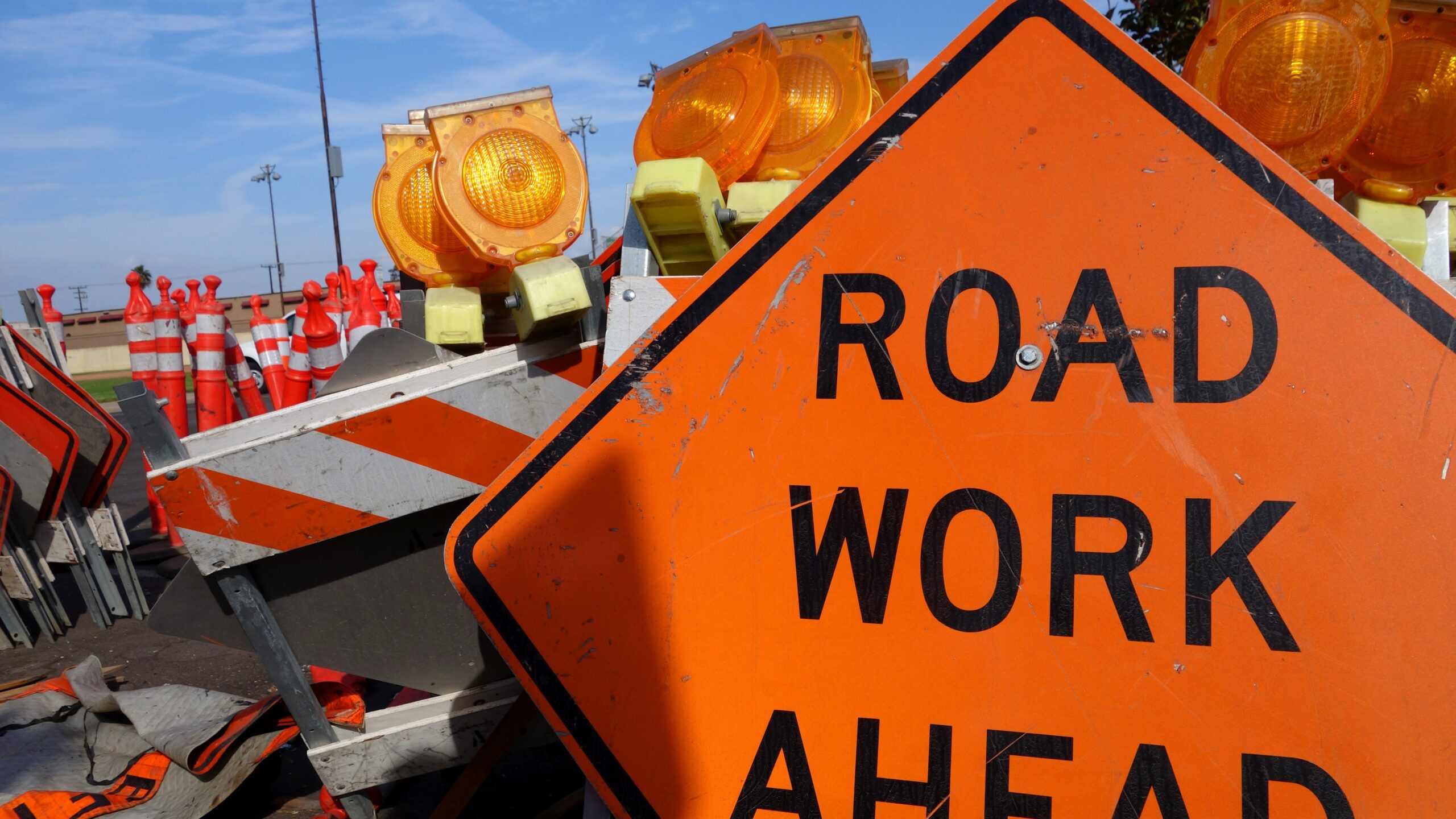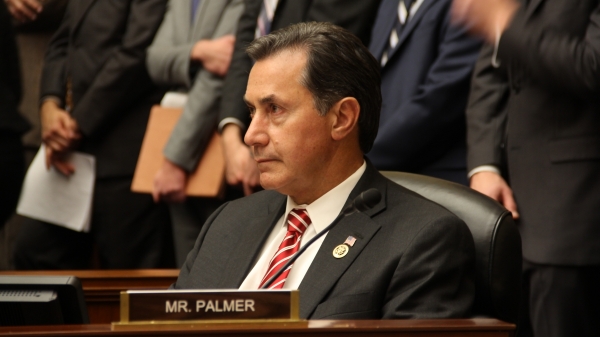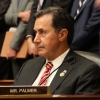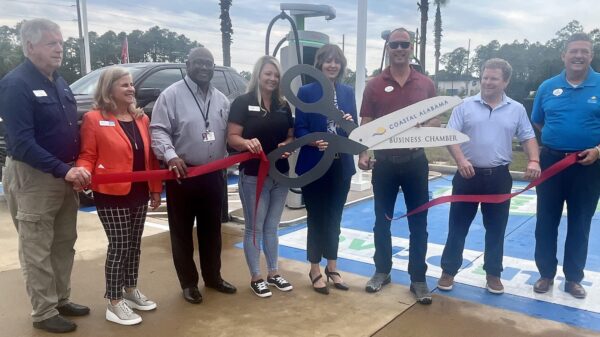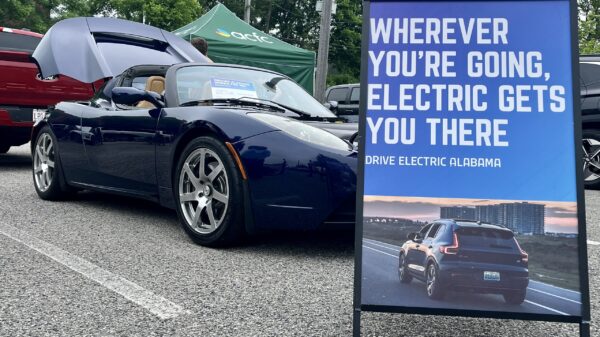President Joe Biden’s $1 trillion bipartisan infrastructure bill signed into law last week will send billions of dollars to bolster Alabama’s highway and bridge infrastructure, improve public transportation and expand electric vehicle charging locations, among other improvements.
“This is what can happen when Republicans and Democrats say we’re going to work together to get something done,” said Sen. Rob Portman, R-Ohio, one of the bill’s authors, speaking at the bill’s White House signing ceremony.
Although 19 Republicans in the U.S. Senate and 13 in the House voted to approve the bill, none of Alabama’s Republican lawmakers in Washington D.C. did so. Only Democratic Congresswoman Terri Sewell, who represents Alabama’s 7th Congressional District, supported the law.
Rep. Gary Palmer, R-Alabama, notably touted how Biden’s bill would help his home state, despite voting against the bill, which drew quick criticism.
“This is the opportunity we have been working for as a region and a state,” Palmer said in a tweet. “Now is the time for us to take advantage of it and complete the work by finishing the Northern Beltline and building a better future for the Birmingham metro area and central Alabama.”
What will Biden’s bill do for Alabama? The list is rather long.
Highways and Bridges
Over five years the state will get approximately $5.8 billion for highways and bridges, which is about 32.3 percent more than Alabama currently gets.
That’s important because as the U.S. Department of Transportation notes in a state-by-state breakdown, in Alabama there are 620 bridges and over 2961 miles of highway in poor condition.
“Since 2011, commute times have increased by 8.9% in Alabama, and on average, each driver pays $434 per year in costs due to driving on roads in need of repair,” the department’s breakdown reads.
Alabama will also get approximately $128 million over five years to reduce transportation-related emissions, and about $146 million over five years to increase the resilience of the state’s transportation system.
Roadway Safety
Alabama will receive approximately $32 million over five years for highway safety traffic programs, which helps reduce deaths and injuries from auto accidents.
Local state municipalities are also eligible to compete for $6 billion in funding for a new Safe Streets for All program aimed at reducing crashes and fatalities, especially for cyclists and pedestrians.
Alabama will also get approximately $44.3 million over five years to strengthen commercial motor vehicle safety efforts.
Public Transportation
The U.S. Department of Transportation says Alabamians who take public transportation spend an extra 66.2 percent of their time commuting, non-white households are 4.5 times more likely to commute using public transportation and 24.8 percent of transit vehicles in the state are past useful life.
Under Biden’s law, Alabama will receive approximately $402 million over five years to improve public transportation options across the state.
Electric Vehicles
Alabama will receive approximately $79 million over five years to expand the state’s network of EV charging stations as part of the law’s $7.5 billion plan to build the first-ever national network of EV chargers.
Alabama will also be able to apply for a portion of the $2.5 billion in grants available for more EV charging stations.
Passenger Rail
Biden’s law set aside $22 billion in grants to Amtrak to eliminate maintenance backlog, $24 billion as federal-state partnership grants for Northeast Corridor modernization and $12 billion for partnership grants for intercity rail service, including high-speed rail.
Alabama will be eligible to apply for a portion of the $5 billion available for rail improvement and safety grants, and $3 billion for grade crossing safety improvements.
Airports
Alabama will receive approximately $142 million over five years for airport infrastructure development.
In addition to those specific state allocations, the law contains a myriad of new and expanded grant programs that state and local governments can apply for. The information below is from the U.S. Department of Transportation.
- Safe Streets for All ($6B, new) – This program will provide funding directly to local and tribal governments to support their efforts to advance “vision zero” plans and other improvements to reduce crashes and fatalities, especially for cyclists and pedestrians.
- Rebuilding American Infrastructure with Sustainability and Equity (RAISE) Grants ($15B, expanded) – RAISE grants support surface transportation projects of local and/or regional significance.
- Infrastructure for Rebuilding America (INFRA) Grants ($14B, expanded) – INFRA grants will offer needed aid to freight infrastructure by providing funding to state and local government for projects of regional or national significance. The BIL also raises the cap on multimodal projects to 30 percent of program funds.
- Federal Transit Administration (FTA) Low and No Emission Bus Programs ($5.6B, expanded) – BIL expands this competitive program which provides funding to state and local governmental authorities for the purchase or lease of zero-emission and lowemission transit buses as well as acquisition, construction, and leasing of required supporting facilities.
- FTA Buses + Bus Facilities Competitive Program ($2.0B, expanded) – This program provides competitive funding to states and direct recipients to replace, rehabilitate, and purchase buses and related equipment and to construct bus-related facilities including technological changes or innovations to modify low or no emission vehicles or facilities.
- Capital Investment Grants (CIG) Program ($23B, expanded) – The BIL guarantees $8 billion, and authorizes $15 billion more in future appropriations, to invest in new highcapacity transit projects communities choose to build.
- Federal Aviation Administration (FAA) Terminal Program ($5B, new) – This discretionary grant program will provide funding for airport terminal development and other landside projects.
- MEGA Projects ($15B, new) – This new National Infrastructure Project Assistance grant program will support multi-modal, multi-jurisdictional projects of national or regional significance.
- Promoting Resilient Operations for Transformative, Efficient, and Cost-saving Transportation (PROTECT) Program ($8.7B, new) – PROTECT will provide $7.3 billion in formula funding to states and $1.4 billion in competitive grants to eligible entities to increase the resilience of our transportation system. This includes funding for evacuation routes, coastal resilience, making existing infrastructure more resilient, or efforts to move infrastructure to nearby locations not continuously impacted by extreme weather and natural disasters.
- Port Infrastructure Development Program ($2.25B, expanded) – BIL will increase investment in America’s coastal ports and inland waterways, helping to improve the supply chain and enhancing the resilience of our shipping industry. BIL overall doubles the level of investment in port infrastructure and waterways, helping strengthen our supply chain and reduce pollution.
- 5307 Ferry Program ($150M, existing) – BIL retains the $30 million per year passenger ferry program for ferries that serve urbanized areas.
- Electric or Low Emitting Ferry Program ($500M, new) – This competitive grant program will support the transition of passenger ferries to low or zero emission technologies.
- Rural Ferry Program ($2B, new) – This competitive grant program will ensure that basic essential ferry service continues to be provided to rural areas by providing funds to States to support this service.
- Federal Highway Administration (FHWA) competitive grants for nationally significant bridges and other bridges ($12.5B, new) – This new competitive grant program will assist state, local, federal, and tribal entities in rehabilitating or replacing bridges, including culverts. Large projects and bundling of smaller bridge projects will be eligible for funding.
- FTA All Station Accessibility Program ($1.75B, new) – This competitive grant program will provide funding to legacy transit and commuter rail authorities to upgrade existing stations to meet or exceed accessibility standards under the Americans with Disabilities Act.
- Charging and fueling infrastructure discretionary grants (Up to $2.5B, new) – This discretionary grant program will provide up to $2.5 billion in funding to provide convenient charging where people live, work, and shop.
- Reconnecting Communities Pilot Program ($1B, new) – This new competitive program will provide dedicated funding to state, local, MPO, and tribal governments for planning, design, demolition, and reconstruction of street grids, parks, or other infrastructure.
- FHWA Nationally Significant Federal Lands and Tribal Projects ($1.5B, expanded) – This discretionary program provides funding for the construction, reconstruction, and rehabilitation of nationally-significant projects within, adjacent to, or accessing Federal and tribal lands. BIL amends this program to allow smaller projects to qualify for funding and allows 100% federal share for tribal projects.
- Strengthening Mobility and Revolutionizing Transportation (SMART) Grant Program ($1B, new) – The SMART Grant program will be a programmed competition that will deliver competitive grants to states, local governments, and tribes for projects that improve transportation safety and efficiency.








































